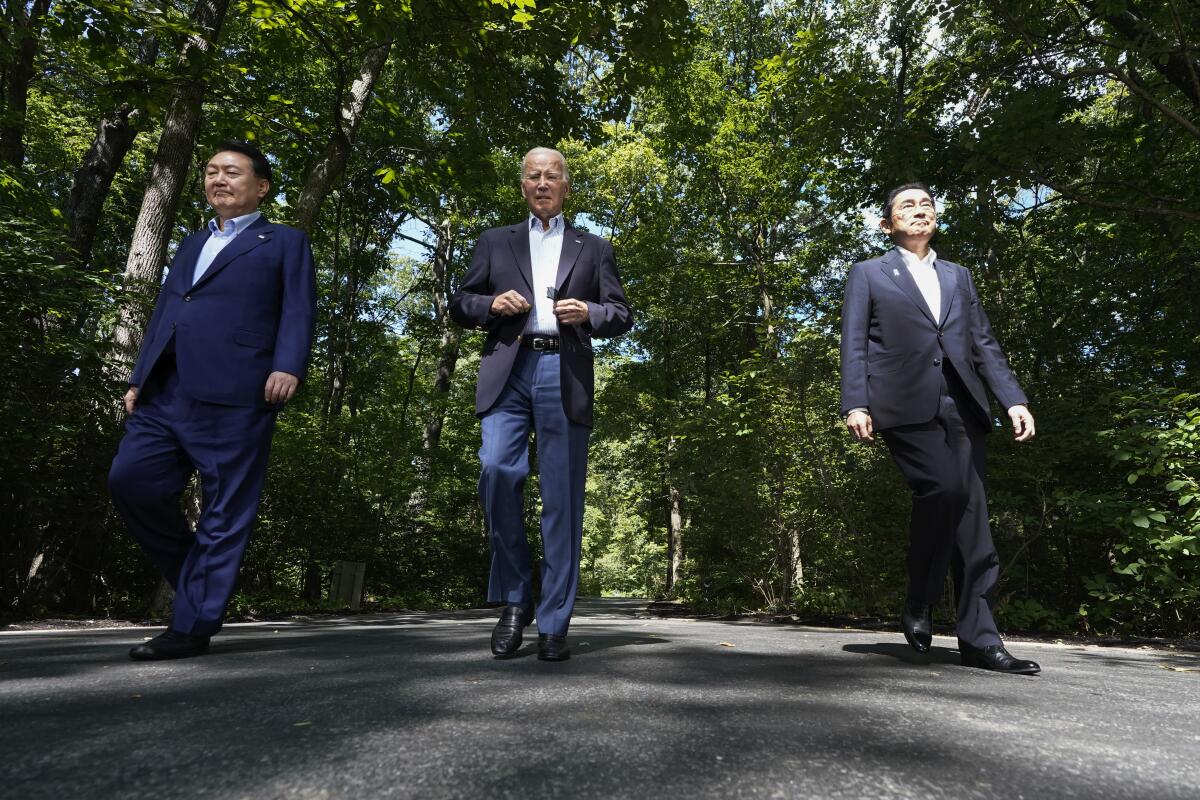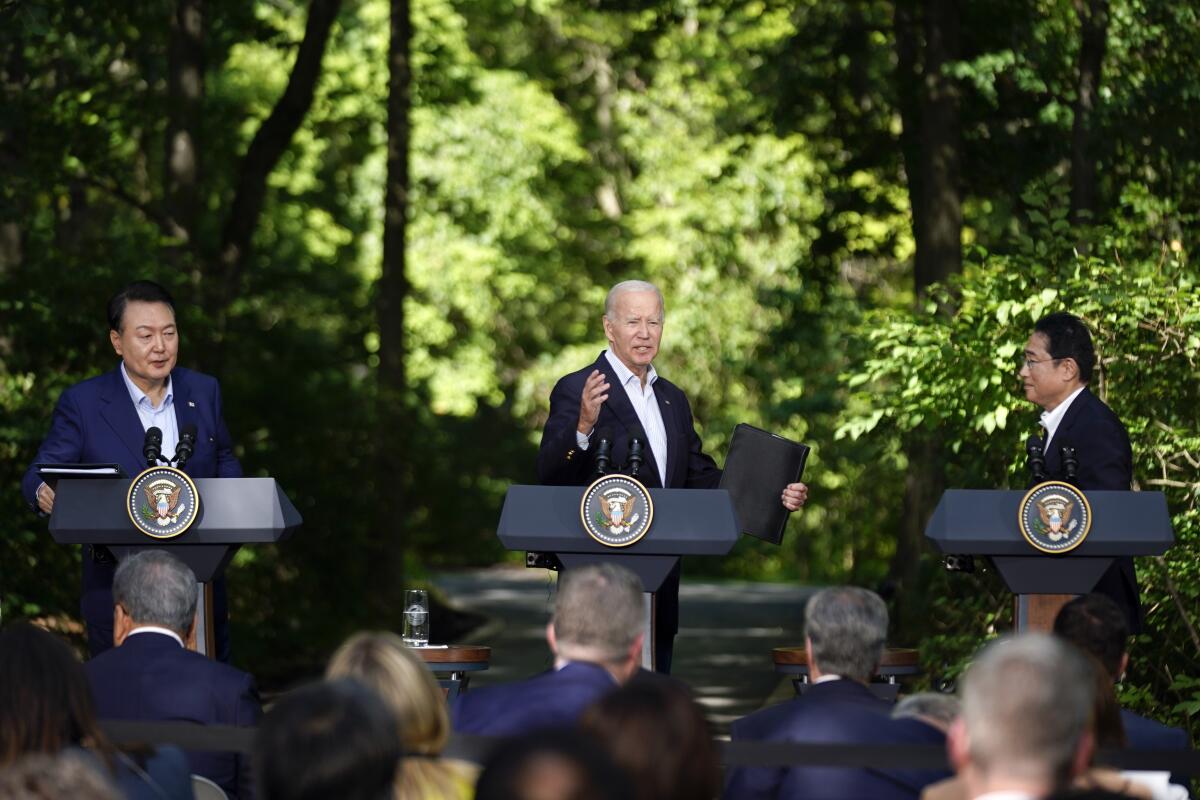Regional threats push Japan, South Korea to Camp David trilateral summit with Biden

- Share via
WASHINGTON — With the twin threats of North Korea and China uniting them, the leaders of Japan and South Korea put aside a history of animus and joined President Biden on Friday at Camp David for a rare three-way summit to plan a joint, long-term defense strategy.
Hailing a “new chapter” in trilateral relations, Biden, Japanese Prime Minister Fumio Kishida and South Korea President Yoon Suk Yeol announced a series of steps, including annual military exercises, improved ballistic missile detection systems, a regional crisis hotline and other measures, to bolster their ability to confront belligerent forces.
“Our countries are stronger and the world will be safer as we stand together,” Biden said from the leafy grounds of the presidential retreat in Maryland, with Kishida and Yoon at his side.
Perhaps the larger issue looming over the news conference that the three held after their meetings was whether any agreements made now by leaders facing domestic challenges would survive their terms in office.
Biden said the initiatives announced Friday were “institutional changes” that would outlast administrations and “create momentum ... to make the relationship stronger and more certain to remain in place.” His predecessor and hopeful successor, Donald Trump, worked to reduce U.S. presence in East Asia and pull back defense assistance.
Biden, Yoon and Kishida emphasized the importance of meeting. Biden praised the “political courage” of his counterparts for attending.
This is the first three-way summit among these leaders not held on the sidelines of another meeting and comes after years of intense diplomacy aimed at easing tensions between the two Asian former enemies. It is also the first meeting with foreign leaders at the highly symbolic Camp David in eight years.
“The fact that we — the three leaders — have got together in this way, I believe, means that we are indeed making a new history as of today,” Kishida said. “The international community is at a turning point in history.”
The White House said the defense agreements announced Friday will shore up cooperation and security throughout the Indo-Pacific region, a vast area of growing economic and diplomatic priority for the Biden administration.
“We are going to lay a strong foundation for this trilateral partnership to make sure that it’s deep, it is strong and that it’s built to last,” Biden’s national security advisor, Jake Sullivan, said as the meeting got underway.
Sullivan said the agreements also prescribe protection against supply chain disruptions and improvements to maritime security in the South China Sea, where Beijing has launched numerous aggressive operations to claim territory, Sullivan said.

The United States has long sought to close gaps in its Asian security profile by bringing together South Korea and Japan, both of whom host U.S. troops and military bases, as a way to confront any attack from North Korea or a Chinese move on the self-governing island of Taiwan.
But historical friction between Seoul and Tokyo, the legacy of Japan’s brutal occupation of Korea in the first part of last century, was until now a stubborn obstacle.
For the gathering to take place, South Korea’s Yoon had to put aside his nation’s grievances, which have always complicated security ties between the two countries. For decades, South Korea has held Japan responsible for a history of sexual slavery of Korean women in that country and for forced labor during the Japanese occupation between 1910-1945. On-again, off-again efforts over the years have attempted to resolve the conflict and compensate the victims, but only with sporadic success.
U.S. officials credit Yoon with working to improve the relationship despite domestic resistance.
Yoon “put capital on the line,” said Robert Daly, head of the Kissinger Institute on China and the United States at the Wilson Center, and Friday’s summit was designed as a “capstone” to the diplomatic shift.
“This is to lock in the gains of the past year and institutionalize a strong mutual defense with a clear connection and commitment,” said Daly, a former U.S. diplomat in Beijing.
U.S. officials seek to make the agreement permanent to prevent it falling by the wayside if and when the political leadership in any or all of the three countries changes. Each leader faces his own array of domestic problems, and Friday’s summit itself may have repercussions.
For Yoon, this initiative playing out at Camp David is politically risky; for Kishida, less so, because Japan has not given up as much in pursuing rapprochement with Seoul, said Shihoko Goto, deputy director of the Asia program at the Wilson Center. Yoon has largely taken the lead, while Kishida has responded. Many Koreans believe Japan owes more in terms of apologies and reparations, while many in Japan feel they’ve already complied. It remains unclear whether the new turns in diplomacy and security truly overcome the mistrust, Goto said.
“So far, it’s been very top-down,” she said. “Does it speak to the hearts and minds of people? I would say that it should speak to the minds, but not necessarily the hearts.”
Despite the concern over whether the agreements will survive future governments, U.S. officials are stopping short of making the new terms part of a formal treaty, which would spell out defense obligations as opposed to commitments, because China and North Korea would likely deem that a major provocation.
Sullivan and other administration officials insisted the agreement does not represent an “Asian NATO,” as China and North Korea complained ahead of the summit. Beijing and Pyongyang are highly suspicious of U.S. military efforts in the region, which a Chinese Foreign Ministry spokesman earlier this week described as “countries forming various cliques” with “their practices of exacerbating confrontation and jeopardizing other countries’ strategic security.”
The summit comes at a time of escalating tensions in East Asia. Both China and North Korea periodically remind the world of their nuclear capabilities, and Pyongyang has launched a series of missiles, including tests of inter-continental ballistic weapons. Beijing repeatedly reasserts its claim to Taiwan and flexes its military muscle in the Taiwan Straits and other parts of the South China Sea.
Also pushing the countries together is the war in Ukraine, where one larger nuclear-armed country, Russia, invaded Ukraine, a smaller neighbor that it claims as its own — much the same scenario as the China-Taiwan dispute.
“The external environment is just so uncertain and unstable,” said Victor Cha, senior vice president for Asia at the Center for Strategic and International Studies. “There is nothing like an actual real war, even though it’s in another part of the world, to completely change the way or affect the way leaders think about their security.”
Greater unity among the U.S., Japan and South Korea is itself a deterrent to some of the region’s aggressions, but a broader and more formalized security plan is essential for long-term guarantees, said Mirna Galic, a senior China policy analyst at the U.S. Institute of Peace and former advisor to the State Department.
“The broader Indo-Pacific will also benefit from trilateral cooperation that moves away from an exclusive focus on the Korean Peninsula and into areas like better support for ASEAN [Assn. of Southeast Asian Nations] and Pacific Islands states,” she said.
The rustic backdrop of Camp David, away from the roiling cauldron of the White House and Washington, D.C., is considered highly symbolic and special, giving the leaders plenty of time for private walks and talks.
Though once a frequent venue for major meetings, and the site of some of modern U.S. diplomacy’s most important pacts, this was the first appearance of foreign leaders at the retreat in Maryland since 2015, when President Obama hosted six Persian Gulf states for a summit over Washington’s international nuclear deal with Iran.
More to Read
Get the L.A. Times Politics newsletter
Deeply reported insights into legislation, politics and policy from Sacramento, Washington and beyond. In your inbox three times per week.
You may occasionally receive promotional content from the Los Angeles Times.











